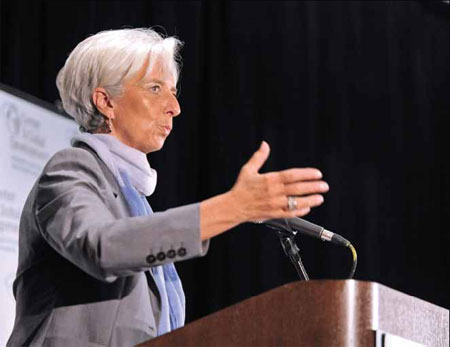World faces triple crisis, IMF chief warns
Updated: 2012-06-13 11:18
By Tan Yingzi in Washington (China Daily)
|
|||||||||||
|
Head of the International Monetary Fund Christine Lagarde asks European policymakers to take decisive steps to break free of the current financial crisis. Wang Yiou / Xinhua |
To ensure development is sustainable, the quest for global economic growth must coexist with environmental protection and social progress, the head of the International Monetary Fund warned Tuesday, ahead of an upcoming UN conference.
"We are facing a triple crisis - an economic crisis, an environmental crisis and, increasingly, a social crisis," IMF Managing Director Christine Lagarde said in a speech at the Center for Global Development in Washington.
"The global economy is still rocked by turmoil, with uncertain prospects for growth and jobs," she told the audience. "The planet is warming rapidly, with unknown and possibly dire consequences down the line. Across too many societies, the gap between the haves and have-nots is getting wider and strains are getting fiercer."
As these threats feed off each other, she urged governments to pursue joint solutions by restoring financial stability, accurately pricing energy including renewable sources and promoting inclusive growth.
The United Nations Conference on Sustainable Development, dubbed Rio+20, is set for Brazil on June 20-22. It will mark the 20th anniversary of the 1992 UN "Earth Summit" in Rio de Janeiro, and the 10th anniversary of the 2002 World Summit on Sustainable Development in South Africa.
The 1992 meeting produced the action plan Agenda 21, the Climate Change Convention and the Convention on Biological Diversity.
It will be the first time since then that the world body has organized an event on this scale, combining the environment, development and economic policy.
World leaders, along with thousands of participants from governments, the private sector and civil society, will gather in Rio to discuss ways to reduce poverty, advance social equity and ensure environmental protection, according to the event's website.
Sustainable development must spring from macroeconomic and financial stability, which in turn pave the way for robust growth and a productive economy, Lagarde said.
She asked European policy makers to take decisive steps to break free of current financial crises.
"First, they need to rekindle demand today, to get the growth engine up and running again. Second, they must make sure that any spark to demand today leads to sustained growth tomorrow, which means reforms on the supply side to boost the productive capacity of the economy."
The IMF will continue to raise resources for concessional lending, to help vulnerable countries navigate an increasingly volatile world, she added. And it will help governments use fiscal policy to address environmental challenges.
"Perhaps we can help with a simple concept that everybody can understand: getting the prices right," Lagarde said. "Getting the prices right means using fiscal policy to make sure that the harm we do is reflected in the prices we pay."
This would include governments' taxing emissions of carbon dioxide to help limit human-generated greenhouse gases that are believed to contribute to changes in Earth's climate, and establishing systems for buying and selling "pollution rights," she said.
On Tuesday, the IMF issued an e-book on carbon pricing, with practical suggestions for countries to design and implement fiscal instruments to reduce greenhouse gas emissions, such as the appropriate design of fuel and other environmental taxes; the measurement of energy subsidies and the taxation of resource industries.
The IMF chief said environmentally sensitive fiscal policy has two distinct advantages.
"First, it is the best and most comprehensive route to reducing environmental damage. It changes relative prices and provides a powerful incentive to change. It can also galvanize clean technology development and deployment by the private sector, such as investment in energy efficiency and renewables.
"Second, in these difficult budgetary times, countries need revenue and these kinds of tax or tax-like instruments can deliver."
Amid the global economic slowdown, especially in Europe, commitments from many UN member countries have fallen short and action has been slow toward meeting goals of past conferences, Sha Zukang, secretary-general of the 2012 Rio summit, has said.
The conference that begins next week will focus on two themes: a green economy in the context of sustainable development and poverty eradication; and the institutional framework for sustainable development. And it will result in a focused political document.
It will also launch a new public and private financing initiative, like a global green economy fund, according to Sha.
tanyingzi@chinadailyusa.com
Today's Top News
President Xi confident in recovery from quake
H7N9 update: 104 cases, 21 deaths
Telecom workers restore links
Coal mine blast kills 18 in Jilin
Intl scholarship puts China on the map
More bird flu patients discharged
Gold loses sheen, but still a safe bet
US 'turns blind eye to human rights'
Hot Topics
Lunar probe , China growth forecasts, Emission rules get tougher, China seen through 'colored lens', International board,
Editor's Picks

|

|

|

|

|

|






